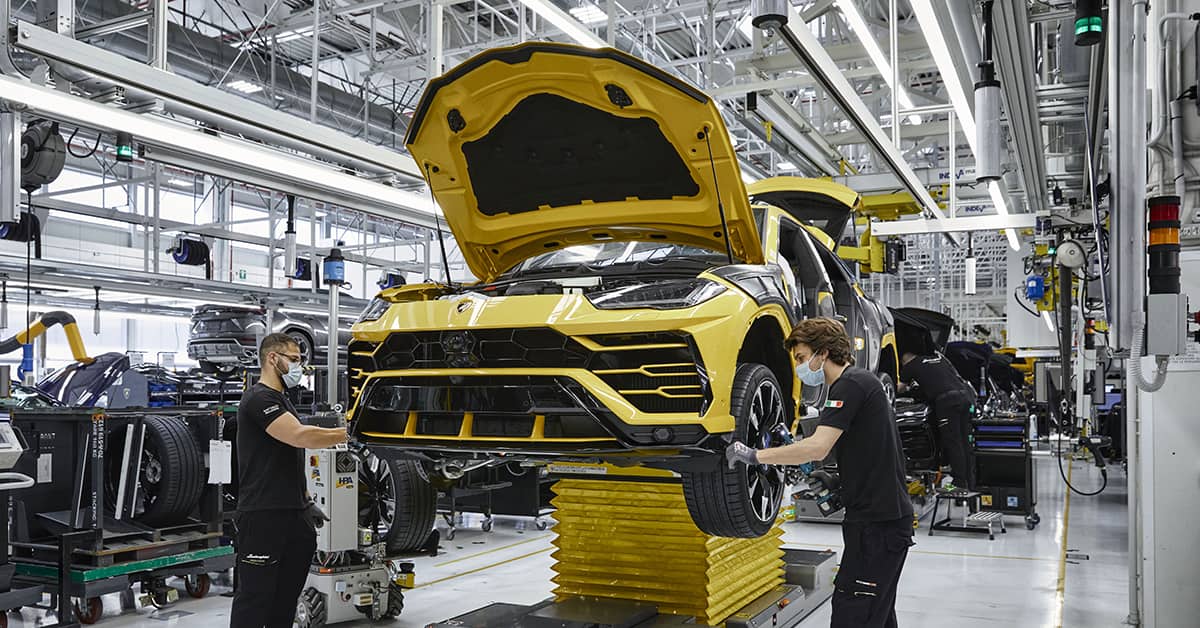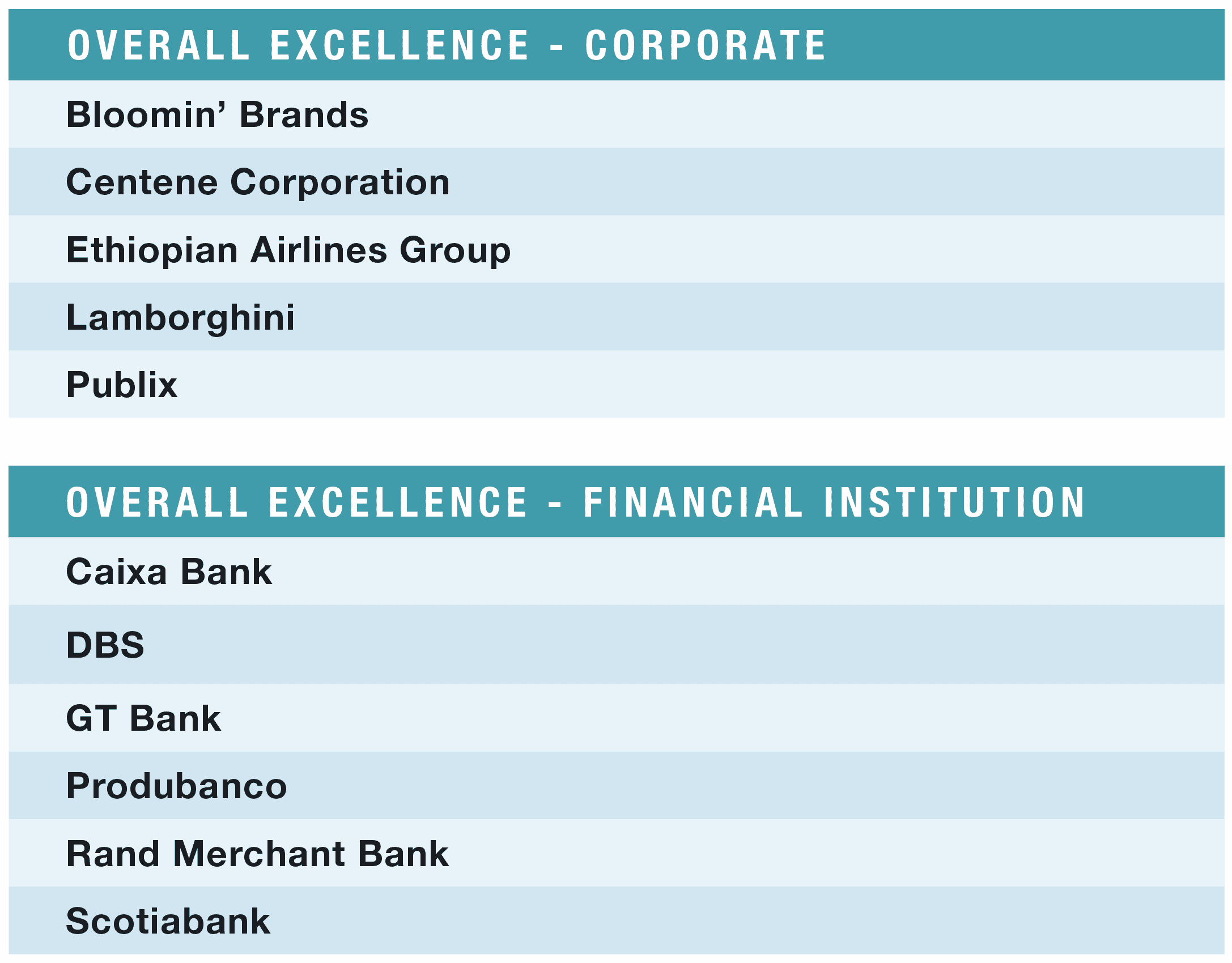These all-star companies delivered in multiple ways for multiple constituents.

AUTOMOBILI LAMBORGHINI
Last spring, Covid-19 tore through Italy with ferocious speed: Its first death was reported February 21, and by March 19, the country’s death toll had surpassed China’s. In addition to enacting protections for its employees, Automobili Lamborghini responded with both speed and ingenuity, mobilizing in collaboration with other companies to deliver critical medical supplies at a peak moment of crisis, putting it in the top tier of corporate responders.
The automaker quickly suspended operations in Bologna as “an act of corporate social responsibility and of great sensitivity towards the Italian people in the extraordinary situation in which we find ourselves right now,” as then-chairman and CEO Stefano Domenicali called it in a press release.
Lamborghini leaders focused on how the company’s key competencies could be deployed to meet the community’s essential needs, Chief Human Capital Officer Umberto Tossini explains to Global Finance.
The automaker immediately refocused its engineers and assembly lines, and within a week, its upholstery workers were making a thousand masks a day for Bologna’s St. Orsola-Malpighi Polyclinic and others. The company’s R&D team joined forces with the Composites Production department to make polycarbonate medical protective visors using 3D printing technology.
Lamborghini also partnered with Bologna-based Siare Engineering International Group to co-engineer and produce 18 breathing simulators per week, using 3D printing. “We are always ready to adapt our pace depending on the outside community’s needs,” Tossini says.
Despite all the challenges, May 7, Lamborghini was still able to launch its latest vehicle, the Huracán EVO RWD Spyder, on May 7—via Covid-safe augmented reality.
BLOOMIN’ BRANDS
The hospitality industry has arguably been hardest hit by the restrictions of social distancing. “Pandemic-related shutdowns resulted in … massive disruptions of our operations and business,” says David Deno, CEO of Bloomin’ Brands.
Bloomin’, best known for its Outback Steakhouse chain, took all the right measures to keep its customers and workers safe: shifting to 100% delivery and take out; redesigning dining rooms to create to-go packing areas and waiting areas; training restaurant staff on new safety standards for food, employees and guests; creating pick-up lines and drive-thrus, and even redesigning menus to allow for family-style dining at home.
Since mid-March, Bloomin’ Brands has donated 140,000 meals to essential workers, including hospital staff, law enforcement, and firefighters. “We are committed to being a good neighbor,” says Deno. “Giving and being active community supporters is woven into the fabric of our DNA—and has been for more than 30 years.”
Yet the company stands out most for its steadfast support of workers. Despite service reductions, Bloomin’ did not terminate or furlough any of its 90,000 employees. The company provided relief pay to about 49,000 hourly workers, also covering 100% of benefit premiums. And the top ranks walk the walk: Deno has forgone his base salary since April, and the directors are waiving any cash retainers.
CENTENE CORPORATION
Healthcare multinational Centene Corp. took action for employees, enabling remote work as much as possible, while also doing everything to protect frontline staff and improve health outcomes for patients. Through a partnership with Feeding America, Centene is donating 12 million meals to the needy across the US, and joined with AT&T to expand infrastructure for telehealth: high-speed wireless broadband services for primary care providers and grants to assist with the upfront investment costs of new devices and equipment.
More importantly, Centene leveraged its expertise and mass trove of current data to identify populations more vulnerable to the coronavirus than others—African Americans, Hispanics/Latinos and Native Americans—and then partnered with research and educational organizations to ensure high-risk communities received optimal healthcare. The company’s analysis of treatment data yielded insights into new therapeutic strategies.
Centene also fired up the ingenuity of its workforce with the Covid-19 SPARK Innovation–a challenge to imagine new solutions. The initiative yielded more than a thousand ideas, some of which are being implemented to help members and providers better manage the pandemic.
ETHIOPIAN AIRLINES GROUP
Closed borders and country lockdowns created real challenges for the aviation business. Ethiopian Airlines Group adapted by rapidly shifting from passenger travel to providing integral services to governments and global NGOs. In addition to showing adaptability, the company reached far beyond its borders. The airline helped other airlines during this time by repairing over 40 airplanes from 12 African and Middle Eastern carriers.
Ethiopian transformed its fleet (without seeking a government bailout or laying off employees) reconfiguring 24 passenger aircraft for maximum cargo capacity. Those planes flew more than 360 flights to deliver essential medical supplies to more than 80 countries. The airline’s warehouse storage capacity of 1 million tons–coupled with the airline’s network and fleet have made the Ethiopian capital of Addis Ababa the humanitarian air hub for the UN World Food Program and the World Health Organization. Their focus on cargo flights helped the airline become a critical facilitator for charities distributing supplies to African countries, such as the UN World Food Program, the African CDC, and the Jack Ma Foundation.
And in a very personal touch, the airline brought home more than 63,000 citizens via hundreds of “repatriation” flights.
PUBLIX
Although Publix implemented a wide range of virus transmission prevention measures—sanitization, masks and plexiglass barriers—the supermarket chain rose above in its efforts to address financial hardship of not only its own workers, but also its ecosystem of suppliers.
The company instituted emergency pandemic pay, paid Covid-19 sick time, and added mental health therapy to benefits packages. It offered rent relief for businesses leasing space in Publix-owned shopping centers. At a time when many were losing jobs, Publix hired over 50,000 new associates.
To assist Southeastern farmers and address food insecurity, Publix purchased over 15 million pounds of produce and 500,000 gallons of milk, donating it all directly to Feeding America member food banks in its operating area. Publix Super Markets Charities donated an additional $5 million dollars to food banks and nonprofit organizations across the southeastern part of the country.
“Food banks across the country have been working tirelessly to meet increased demand, but we cannot do it alone,” says Claire Babineaux-Fontenot, CEO of Feeding America, in thanking Publix for the effort.
Methodology: Behind the Rankings
Selection was limited to entities that submitted entries. After an initial review by a panel of three independent judges, those whose efforts were on par with peers (rather than above the average) were eliminated. The remaining entrants were evaluated, scored in each category and ranked separately by each of the judges as well as two Global Finance editors. Scoring took into consideration local conditions and the capacity of the entrant, and awarded points for speed, innovation and cross-border reach.




